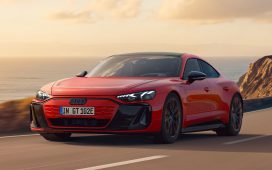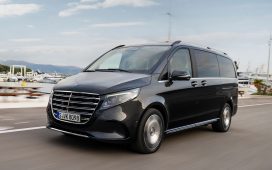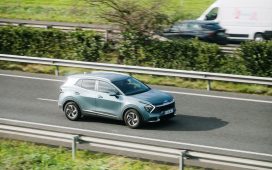Ford, Chevrolet and Hyundai sold the highest number of all-electric cars other than Tesla last year.


The year 2023 is behind us, and with the search for sales data ending for the year, it’s time for a summary.
All-electric car sales in the United States increased quite significantly in Q4 and in 2023, reaching new record levels. In today’s post, we will focus on the non-Tesla battery electric vehicle (BEV) sales, which were a major engine of growth.
Get Fully Charged
BEV sales surged in 2023
In 2023, all-electric car sales increased to about 1.1 million units (estimated). Out of that, no less than 450,000 were sold by traditional carmakers.
According to sales data analyzed by InsideEVs, during the fourth quarter, the 19 brands we mention below sold over 134,000 all-electric vehicles. That’s a 60% increase year-over-year and a new quarterly record.
This includes traditional carmakers that report their all-electric car sales in the U.S., like Audi, BMW, General Motors’ BrightDrop delivery van division, Cadillac, Chevrolet, Ford, Genesis, GMC, Hyundai, Kia, Lexus, Mazda, Mercedes-Benz, Nissan, Porsche, Subaru, Toyota, Volkswagen and Volvo.
Not all manufacturers report their sales results in the U.S., especially the newer companies like Tesla, Rivian, Polestar and Lucid. They do not break out sales by country or region so their figures can’t be included in this report.
The total BEV sales by the 19 mentioned brands amounted to a new record of over 450,000 in 2023, which is roughly 83% more than a year ago. This is a clear sign of fast expansion.
For reference, Tesla’s sales in the U.S. are estimated at over 600,000 according to a separate report (up by a third year-over-year), which combined with some of the other brands, gives us more than 1.1 million units (estimated) in 2023.
In the coming quarters, non-Tesla brands are expected to sell more all-electric cars than Tesla (it already happened in some recent months). It will make this type of report more and more important as we try to understand the U.S. market situation.
BEV Sales By Brands – Q4 2023
In Q4, Ford sold the highest number of all-electric vehicles (again, excluding Tesla) in the U.S.—25,937. It was the same in Q3.
However, the next two positions are occupied by luxury brands: BMW (14,374) and Mercedes-Benz (13,511).
Then we can see Chevrolet (13,457), including 12,551 Chevrolet Bolt EV/Bolt EUV (the discontinued duo by the way). Hyundai was right behind with 13,293 units sold, but we don’t the number of Hyundai Kona Electric sales so perhaps Hyundai is ahead of Chevrolet.
Our tree map chart reveals a relatively strong position for Volkswagen (10,634), Kia (8,274) and Audi (7,411).
* Excludes Tesla and other brands for which data was not available
** Hyundai sales without the Hyundai Kona Electric model
Now let’s take a look at the share of BEVs out of the automaker’s total sales. This shows how advanced a carmaker is on its electrification journey to become 100% electric someday.
The list of brands includes only traditional ones, for which data is available. Brands that sell only all-electric cars (like Tesla) are excluded for the obvious reason that the share is always 100 percent.
In Q4, the highest BEV share was achieved by the Mercedes-Benz brand (excluding vans) at 18.7%.
Then we can see several more European brands (mostly premium ones): BMW (13.3%), Audi (12.2%), Porsche (12.4%), and Volkswagen (11.0%). After the all-German top five, we see Genesis (11.0%) and Cadillac (10.5%).
Ford improved its BEV share from 4.4% in Q3 to 5.6% in Q4 and is now between Hyundai (6.5%) and Kia (4.7%), but noticeably ahead of Chevrolet (3.3%).
Here is a tree map version of the chart:
* Excludes Tesla and other brands for which data was not available
** Hyundai sales without the Hyundai Kona Electric model
*** Mercedes-Benz (excluding vans)
BEV Sales By Brands – Q1-Q4 2023
In 2023, Ford sold 72,608 all-electric vehicles, which makes it the second top BEV brand in the country after Tesla. Chevrolet was third with 62,988 units, including 62,045 Bolt EV/Bolt EUV.
Hyundai was the best of the rest with at least 46,917 BEV sales, followed by BMW (45,417) and Mercedes-Benz (43,202). Then we can see Volkswagen (37,789), Kia (32,154), Audi (25,039) and Nissan—the last one above 20,000.
We believe that Rivian (not listed here) might be between 40,000 and 50,000, depending on how many of its 50,122 deliveries happened in the U.S.
* Excludes Tesla and other brands for which data was not available
** Hyundai sales without the Hyundai Kona Electric model
Let’s now move to the share of BEVs out of the automaker’s total sales. According to sales data analyzed by InsideEVs, in 2023, several brands exceeded 10% BEV share but the majority are still in the very early stage of electrification.
The Mercedes-Benz brand is the number one with 15.3%. BMW achieved 12.5%, while Volkswagen 11.5%. In general, we can see a mix of imported and premium brands at the top.
Hyundai noted about 5.9% (without the Kona Electric model), Kia 4.1%, Ford 3.8% and Chevrolet 3.7%.
For reference, the U.S. BEV average share in 2023 is expected to be about 7.5%. However, this includes all brands, like those selling only electric cars (Tesla). Because Tesla alone sold more than half of the BEVs in the U.S. last year, the real average BEV share for traditional brands is probably closer to 3%.
In other words, even Chevrolet with 3.7% appears to be above average, while Nissan (once an all-electric car pioneer) is below average at just 2.5%.
Here is a tree map version of the chart:
* Excludes Tesla and other brands for which data was not available
** Hyundai sales without the Hyundai Kona Electric model
*** Mercedes-Benz (excluding vans)
In 2024, we might see the first traditional brands above 20% share of all-electric car sales, while the average should move towards 5-10%.
Stay tuned for more data on which brand is the most electrified. If you are interested in seeing more detailed sales results for the individual brands, please check our previous reports:








